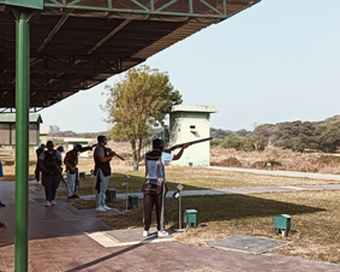 PM Modi visit USA
PM Modi visit USA Only the mirror in my washroom and phone gallery see the crazy me : Sara Khan
Only the mirror in my washroom and phone gallery see the crazy me : Sara Khan Karnataka rain fury: Photos of flooded streets, uprooted trees
Karnataka rain fury: Photos of flooded streets, uprooted trees Cannes 2022: Deepika Padukone stuns at the French Riviera in Sabyasachi outfit
Cannes 2022: Deepika Padukone stuns at the French Riviera in Sabyasachi outfit Ranbir Kapoor And Alia Bhatt's Wedding Pics - Sealed With A Kiss
Ranbir Kapoor And Alia Bhatt's Wedding Pics - Sealed With A Kiss Oscars 2022: Every Academy Award Winner
Oscars 2022: Every Academy Award Winner Shane Warne (1969-2022): Australian cricket legend's life in pictures
Shane Warne (1969-2022): Australian cricket legend's life in pictures Photos: What Russia's invasion of Ukraine looks like on the ground
Photos: What Russia's invasion of Ukraine looks like on the ground Lata Mangeshkar (1929-2022): A pictorial tribute to the 'Nightingale of India'
Lata Mangeshkar (1929-2022): A pictorial tribute to the 'Nightingale of India' PM Modi unveils 216-feet tall Statue of Equality in Hyderabad (PHOTOS)
PM Modi unveils 216-feet tall Statue of Equality in Hyderabad (PHOTOS)India Open Competition in Shotgun, organised by the National Rifle Association of India (N
- Hockey India names Amir Ali-led 20-man team for Junior Asia Cup
- Harmanpreet Singh named FIH Player of the Year, PR Sreejesh gets best goalkeeper award
- World Boxing medallist Gaurav Bidhuri to flag off 'Delhi Against Drugs' movement on Nov 17
- U23 World Wrestling Championship: Chirag Chikkara wins gold as India end campaign with nine medals
- FIFA president Infantino confirms at least 9 African teams for the 2026 World Cup
India, Indonesia elevate ties to Comprehensive Strategic Partnership Last Updated : 30 May 2018 01:45:51 PM IST 
India, Indonesia elevate ties to Comprehensive Strategic Partnership
India and Indonesia elevated their bilateral ties to that of a Comprehensive Strategic Partnerhsip and issued a shared vision for maritime cooperation in the Indo-Pacific region following a bilateral summit between Indian Prime Minister Narendra Modi and Indonesian President Joko Widodo here on Wednesday.
The two sides also signed 15 agreements, including on defence and economic cooperation.
Reflecting India's growing ties with Southeast Asia under New Delhi's Act East Policy, the two sides issued a joint statement on "Establishing Comprehensive Strategic Partnership Between Indonesia and India" which said that Modi and Widodo held extensive talks on bilateral, regional and global issues of mutual interest, and provided strategic directions that would further enhance the solid and expanding relations between the two countries.
"To enhance the two countries' strategic partnership, the leaders agreed to hold annual summit meetings, including on the margins of multilateral events," the statement said.
"They also stressed the importance of continuing regular bilateral consultations through the robust architecture of dialogue in place, including the ministerial and working group mechanisms."
According to the statement, both leaders reaffirmed that teir countries, as strategic partners and maritime neighbours, must work to further strengthen and broaden the already robust defence cooperation.
"The leaders reaffirmed their commitment in the field of defence, with the signing of the Defence Cooperation Agreement between the two countries," it stated, adding that the this will further strengthen and renew the existing cooperation for mutual benefit of the two countries and the region.
Modi and Widodo also agreed to further enhance mutual trust through regular meetings and staff talks between armies, navies and air forces of the two countries.
In the area of defence industry, they took note on the progress made through the joint production of military equipment and identified cooperation in defence industry and technology as areas of great potential.
In terms of economic cooperation, the two sides sides agreed to work intensively for the early conclusion of the Regional Comprehensive Economic Partnership (RCEP) and reiterated that it needs to be comprehensive, fair and balanced with benefit to all member states.
RCEP is a proposed free trade agreement between the Association of Southeast Asian Nations (Asean) regional bloc and the six states with which Asean has existing free trade agreements - Australia, China, India, Japan, South Korea and New Zealand.
The Asean comprises Brunei, Cambodia, Indonesia, Laos, Malaysia, Myanmar, the Philippines, Singapore, Thailand and Vietnam.
"President Joko Widodo welcomed the increase in Indian investments in Indonesia and appreciated their contribution to the Indonesian economy," the statement said.
"Prime Minister Modi also welcomed Indonesian companies' participation through the Make in India initiative and invited Indonesian business to avail of the opportunities presented."
The joint statement said that as maritime neighbours, the two countries underlined the importance of stronger connectivity, particularly on sea links, in order to facilitate economic cooperation and people-to-people contact.
Modi and Widodo welcomed the plan to build connectivity between Andaman Nicobar in India and Aceh in Indonesia to unleash the economic potentials of both areas.
"Furthermore, the two sides looked forward to the expeditious conclusion of the Asean-India Maritime Transport Cooperation Agreement," the statement said.
The two leaders also reiterated their "strong condemnation of terrorism in all its forms and manifestations including cross-border terrorism and terror-related incidents in Indonesia and India and affirmed that perpetrators of these henious acts must be brought to justice".
In a manifestation of the growing geostrategic importance of the Indo-Pacific region, the two sides issued a separate statement on "Shared Vision of Indo-Indonesia Martime Cooperation in the Indo-Pacific".
"In today's changing scenario in the Indo-Pacific region, we (India and Indonesia) are geostrategically located," Modi said in a joint address to the media with Indonesian President Joko Widodo following a bilateral summit here.
"Under India's Act East Policy, we have SAGAR - Security and Growth for All in the Region - that matches with President Widodo's Global Maritime Fulcrum," he said.
While Modi's SAGAR initiative underscores India's engagement in the Indian Ocean region, Jokowi's Global Maritime Fulcrum seeks to capitalise on Indonesia's geographic position to make the southeast Asian nation a "fulcrum" of Indo-Pacific maritime activity.
India is also part of a recently revived quad, including the US, Japan and Australia, that seeks to work for peace and prosperity in the Indo-Pacific region.
According to the statement on maritime cooperation, both sides recognised "that with a coastline of 7,500 km, with more than 1,380 islands and more than two million sq. km of Exclusive Economic Zone, India occupies a central position in the Indo-Pacific, while Indonesia as the largest archipelagic state in the world, with a coastline of 108,000 km, with 17,504 islands and features and a total of maritime area of 6,400,000 sq. km including Exclusive Economic Zone, is a fulcrum that connects the Indian Ocean and Pacific Ocean".
"The two oceans represent a combined maritime region which is important for global maritime trade and commerce," it stated.
It also called for adhering to the rights and obligations under the international law including the Charter of the United Nations, the UN Convention on the Law of Sea (Unclos) and the Treaty of Amity and Cooperation in Southeast Asia (TAC).
Modi arrived here on Tuesday on the first leg of his five-day three-nation tour of southeast Asia that will also see him visiting Malaysia and Singapore.
This is his first visit to Indonesia as Prime Minister.IANS For Latest Updates Please-
Join us on
Follow us on








172.31.16.186







